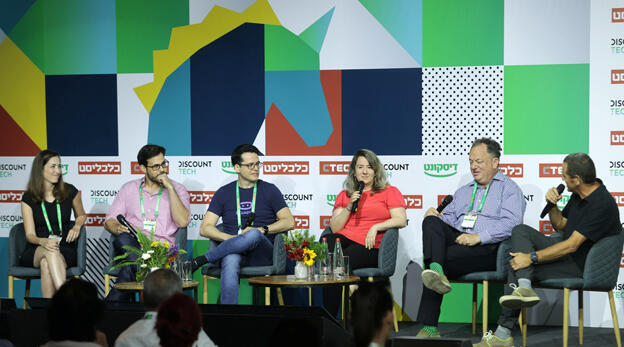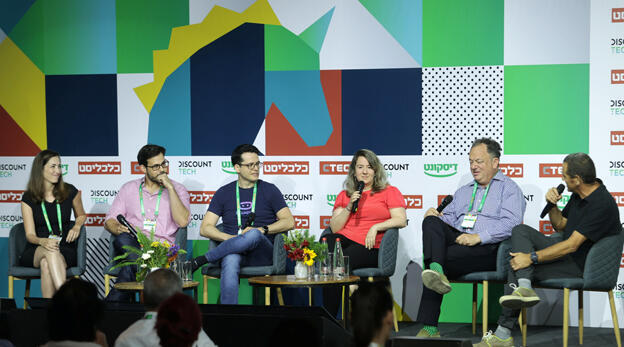
Unicorns Forum
"The fight for high-tech talent continues but wages will not continue to rise"
Noam Schwartz, co-founder and CEO of ActiveFence, was speaking at Calcalist and Discount Bank's Unicorns Forum. Ofer Feldman, co-founder of Stampli: “The market was flooded with jobs, even if we see a reduction there is still a lot of demand for every employee”
What has changed in the world of unicorns? What will happen and how will the economy respond to these changes? Gil Brandes, partner and head of the high-tech department at Naschitz Brandes Amir, Anat Shakedd, co-founder and CEO of Nexite, Ofer Feldman, co-founder of Stampli, Noam Schwartz, co-founder and CEO of ActiveFence, and Nofar Amikam, General Partner at Glilot Capital, all tried to answer this question as part of a panel held at the Calcalist and Discount Unicorns Forum.
How has the economy changed?
Anat Shakedd: "We started three-and-a-half years ago and raised about $100 million. We enable to maximise sales and we sell a product that serves as the eyes of the retailer in their stores. For example, which goods attract more people and where are items located. And the change we are experiencing is reflected in our market, the fashion market. It's a $750 billion market that is looking for technology investments and will continue to grow. It's a market where, in times of uncertainty, return on investment becomes a significant issue. Our insight is that companies no longer have the privilege of expecting customers to make large investments on day one. Therefore, we have changed our go-to-market strategy - from full scale deployment in all stores to a model with a limited number of stores that are used as a focus group for the entire chain."
There is talk about fintech being affected by the crisis.
Ofer Feldman: "We have been around for eight years and have raised $87 million. We sell artificial intelligence-based software to organizations so that they can manage their procurement processes. First of all we are a product oriented company, and only then are we a fintech company. The financial process we are enabling is a by-product, and it is indeed noticeable in the markets that we invest more in the product itself, a product that enables organizations to grow and become more efficient."
Do you feel that being a unicorn is scary?
Ofer Feldman: "We do not want to be a unicorn and, we are not a unicorn. We focused on efficiency and sales, today there is cynicism that accompanies the term unicorn, but a real unicorn is a worthy thing, it has revenue and value justification. However, the name unicorn has no real value."
What has changed in your field? What do you feel? Is there a change?
Noam Schwartz: "We are in an interesting industry that helps Internet companies upload content to the web. We assist companies in understanding what went online and in protecting problematic content, such as child-threatening content. We were founded four years ago and have 300 employees and raised about $100 million about a year ago. The change I see today, which began as early as last year, is that everyone is more goal and target oriented. Whether it is investors or companies. The unicorn concept is not a healthy concept, we need to know if we can really scale our business, and today there is a lot more pressure that the journey will be clearer, with fewer bells and whistles.”
You’ve invested in companies and also refused to invest in companies. How do you see the situation as a venture capital fund?
Nofar Amikam: "I am a partner in Glilot Capital, we manage $700 million in assets. We all see the changes and there is a decrease in the value of public companies issued in recent years. A year ago, we saw companies raise seven or eight million dollars and today, the average is four to five million dollars. There is also a change in early stage companies, and I think it's healthy. There are things that have not changed. Israeli cyber week is taking place and the desire to adopt innovative technologies is tremendous. Companies that have cracked the issue of the essential need for survival and growth will continue to grow. Factually, companies have raised a lot of money in recent years."
Through your eyes as a law firm we can analyze investment deals and M&As. What happened in 2022?
Gil Brandes: "In times of crisis and instability many of the companies we represent come to us for consultation. We provide services to early stage companies and continue as they progress. We represent many funds and deal with intellectual property support as well as later stages. We are currently seeing a slowdown - if previously funds wanted to close an investment deal within four weeks, today the valuation and investment process has changed and we are seeing smaller fundraising volumes. There is a transition that feels right to lower investment volumes at this time. Even a company that has raised $150 million before now understands that this window may actually be closed for three years, and that means it will be much more complicated to raise a large amount in the private market."
In 2021 we have dealt a lot with the subject of talent. It’s 2022 and we are hearing less about it. Will wages increase? Will the pursuit of talent end?
Noam Schwartz: "Wages will not drop significantly but will not continue to rise. Recently we came across a company that closed its doors and we gave job offers to its employees, one of the employees sent us an email that he received an offer for 10K NIS more - so the war is not over. However, there are many companies that will reduce wages. There are excellent companies in the country and they are currently recruiting so the demand for skilled employees will remain stable. Just this last week we have recruited five people."
Ofer Feldman: "At the end of last year we decided to slow down our recruitment rate. However, we are still recruiting and the trend in the market hasn’t significantly changed. The market was so flooded with jobs that even if there is a reduction there is still a lot of demand for every employee. It's difficult to find someone specific and it's also expensive."
Anat Shakedd: "We are recruiting at about the same rate, however in January, when we realized where things were heading, we examined our budgets again. At the moment it is very important to maintain transparency, we are on the back of a large round and our employees expected growth. It was important for us that we explained what we were doing and why. The market situation is not our fault, however, like any other company it is our problem, and we want to control our own destiny. This allowed employees to feel that they should not be afraid of layoffs. The employees control their fate and the fate of the company."
Nofar Amikam: "I think there is still a shortage of employees and there are jobs that are important to fill. With all the importance of staying balanced, growth is also important and high quality manpower is important."
Gil Brandes: "Manpower is a huge issue. In our world, if there is a certain talent that comes along that we do not need, we will still recruit them because they are considered a talent. A lot of start-up planning is spent around spending - and there will be changes. I'm a little reluctant to say, however, that I think salaries will decrease. There will be a correction and it will make sense."















